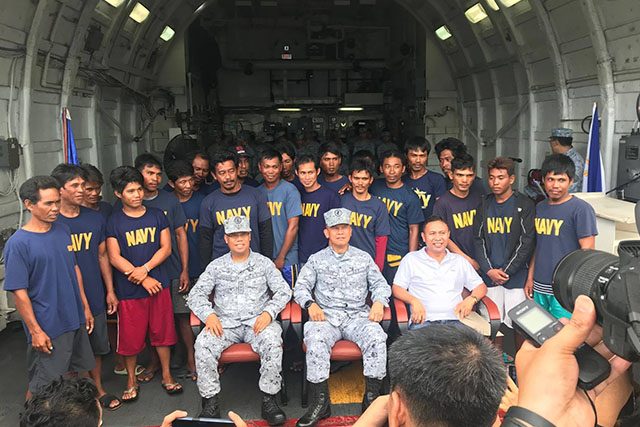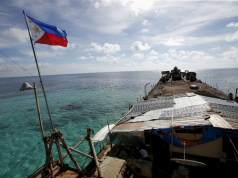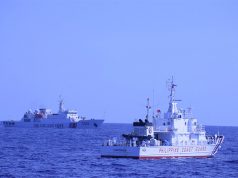
At least three experts shared their thoughts and interpretations on social media about the controversial collision between a Chinese fishing vessel and a Filipino boat in the West Philippine Sea.
Maritime law expert Jay Batongbacal on Twitter called it a “deliberate and intentional ramming,” citing that there was “much room” for other vessels in open waters.
“There is no ‘maybe’ here; PH fishing vessel was anchored in open waters, much room for other vessels to avoid hitting it. This was a deliberate and intentional ramming. Failure to render assistance proves the intention to deliberately cause harm.”
Jimwel Tañedo, a cousin of the captain of the Filipino vessel, said that the crewmen were asleep off Reed (Recto) Bank when a Chinese boat rammed sank their boat.
They were shocked to find out that the boat was already damaged.
The Chinese fishing vessel immediately left when it collided with the anchored Filipino boat.
The crewmen were only rescued by a Vietnamese fishing vessel that happened to pass by the vicinity after almost six hours.
Philippine Navy chief Vice Admiral Robert Empedrad maintained that the Filipino boat was “anchored” and in a stationary state.
Based on the International Rules of the Road, it makes it the “privileged” one between the two, he said.
“The Filipino vessel was anchored when the incident happened. If you base that on International Rules of the Road, dapat privileged ‘yung naka-anchor kasi hindi siya makaka-evade. Alam natin lahat ‘yan, alam ng mga seafarers, commanding officer ng mga vessels,” Empedrad said in an interview.
“We don’t ram ships that are not moving, that are anchored. Makikita mo ‘yan sa radar na ‘di gumagalaw ‘yung barko. So ‘pag ‘di gumagalaw ‘yung barko, bakit mo babanggain?” he added.
Record of sinking vessels
Batongbacal stated in an interview that China’s action may be deliberate since it has a record of sinking Vietnamese fishing vessels in maritime areas it claims to own.
“Pinapalubog ng mga Chinese vessels o kaya mga Chinese units ‘yung mga Vietnamese fishing vessels. Kaya dapat concern natin ‘yan na hindi ‘yun ma-replicate dito sa side natin sa West Philippine Sea,” he said.
A moving vessel would not collide with an anchored vessel in the open ocean and endanger the safety of those onboard, the director of the UP Institute for Maritime Affairs and Law of the Sea said.
Last March, a Chinese maritime surveillance vessel chased a Vietnamese fishing boat in the contested waters around the Paracel Islands and fired a water cannon at it, making it sink.
The Vietnamese fishing boat was eventually rescued by another Vietnam-flagged fishing boat.
Vietnam lodged a protest with China’s embassy in Hanoi and demanded that the Asian giant deal with its maritime surveillance agency.
However, Chinese foreign ministry spokesperson Geng Shuang said Vietnam has been involved in illegal fishing activities, adding that the Paracel Islands belong to China.
Chinese vessels as ‘maritime militia’
Another expert recalled how some vessels in China’s militia force in the South China Sea are fronting as commercial fishing vessels and keeping watch in the disputed waters instead.
Gregory Poling, the director of Washington-based think tank Asia Maritime Transparency Initiative, said that the incident on Recto Bank was the “inevitable result of Beijing deputizing hundreds of fishing boats as a militia force.”
“Chinese fishing vessel sinks a Philippine boat and leaves the 22 crew to the elements. Luckily Vietnamese fishers rescued them. This is the inevitable result of Beijing deputizing hundreds of fishing boats as a militia force. And it will happen again,” he wrote on Twitter.
In a previous special report, Poling further explained the nature of China’s militia force in the South China Sea:
“A different kind of fishing fleet, one engaged in paramilitary work on behalf of the state rather than the commercial enterprise of fishing, has emerged as the largest force in the Spratlys.”
He noted that a large number of Chinese fishing vessels have been discovered on Subi and Mischief Reef of the Spratly Islands in 2018.
“An analysis of historical imagery shows that the numbers of Chinese ships at Subi and Mischief were much higher in 2018 than in 2017. In August, which appears to have been the busiest month, there were about 300 ships anchored at the two reefs at any given time,” Poling said.
“In almost every case, the Chinese fishing boats captured in imagery are riding at anchor or transiting without fishing,” the security expert added.
It’s still within Philippine waters
Another expert in Asian-Pacific security issued a reminder that the Permanent Court of Arbitration under the United Nations in 2016 ruled in favor of the Philippines and effectively dismissed the validity of China’s nine-dash line claim.
Patrick Cronin, Asia-Pacific security chair at Hudson Institute, said that the Reed Bank incident near the Spratlys is a “good time to recall” the arbitration case which China has continuously failed to recognize.
Latest incident in Spratlys is a good time to recall that 2016 international tribunal condemned Chinese encroachment on Philippines' rights over its own Exclusive Economic Zone https://t.co/QyhbtRcETX
— Patrick Cronin (@PMCroninHudson) June 12, 2019
The text of the award by Hague-based international tribunal reads:
“[A]s between the Philippines and China, China’s claims to historic rights, or other sovereign rights or jurisdiction, with respect to the maritime areas of the South China Sea encompassed by the relevant part of the ‘nine-dash line’ are contrary to the Convention and without lawful effect to the extent that they exceed the geographic and substantive limits of China’s maritime entitlements under the Convention.”
For the tribunal, there was no evidence that China exercised exclusive control over the disputed waters or its resources.
It added that China has violated the Philippines’ sovereignty rights in the archipelago’s exclusive economic zone by interfering with the country’s fishing and petroleum exploration, constructing artificial islands and failing to prevent Chinese fishermen from fishing in the zone.









